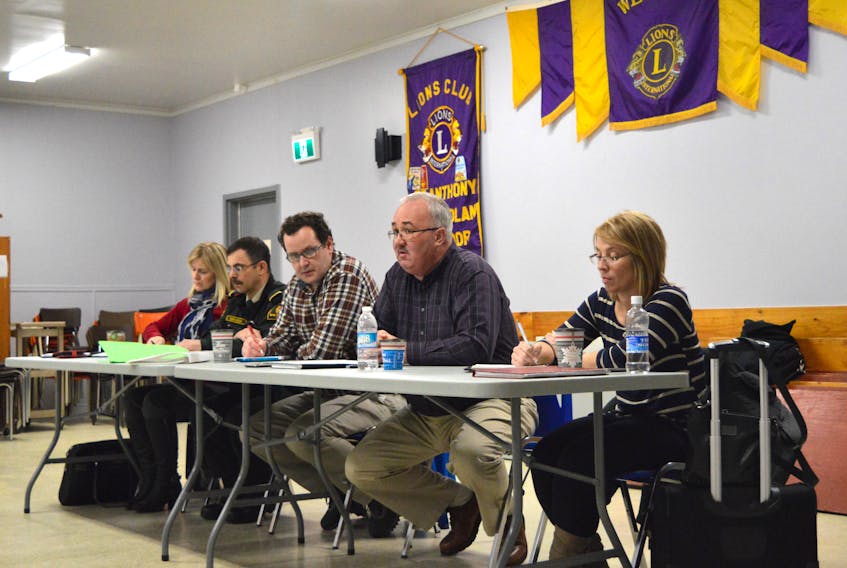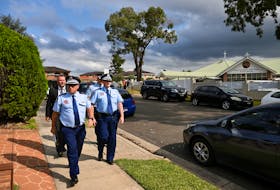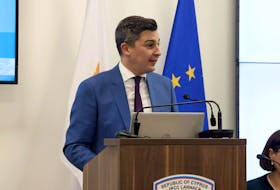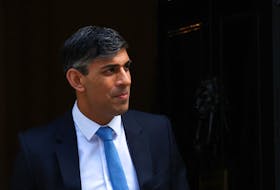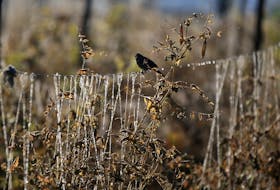ST. ANTHONY, NL – In a packed hall on a crisp December evening, fishermen offered their insights to ensure a future for Newfoundland and Labrador’s fishery.
Inshore harvesters from St. Anthony and surrounding area spoke on a variety of topics.
Issues and suggestions were voiced about the state of fish like cod, crab and capelin, as well as paths for new technologies and ways to bring young people into the industry.
The meeting was held Wednesday, Dec. 6 at the Lions Club in St. Anthony. It was organized and attended by several Department of Fisheries and Oceans (DFO) representatives in hopes of better understanding the needs and concerns of harvesters in the area.
Ron Burton, DFO area director for Grand Falls-Windsor, led the discussion, with Laurie Hawkins, resource manager for the 4R division; David Small, resource manager for the 3K division; Sheldon Eddison, fishery officer for the St. Anthony area; and Ellen Careen, regional resource manager for shellfish.
After a brief introduction, the DFO representatives immediately took questions from the fishers.
Changes needed in cod quota
Goose Cove fisherman Maxwell Sexton voiced the need for higher cod quotas in August and September. He received vocal support from other harvesters, and many called for the re-opening of the cod fishery in July.
“By October the fish is getting pretty scarce, and with weather conditions and everything we can’t get out this time of year,” said Sexton. “We’re ready in July so long as a buyer’s ready.”
3K harvester Kevin Newman reiterated this need for higher quotas when the fish are most plentiful.
“It’s no use to give me a big quota to catch in November,” said Newman. “The prime time to fish in our area is when we’re given the littlest quota; it’s not working.”
Ron Burton agreed with their sentiment, also noting the fishery on the Great Northern Peninsula can be drastically different than other parts of the island.
“It’s a whole different world up here. The bottom line is you want to be able to catch the fish when the fish is here,” Burton said.
Many harvesters lost valuable fishing time this summer due to lack of buyers for Northern Peninsula cod fishers.

Larry Cull of Englee says he lost out on three weeks this year, due to the fact he had no one to buy his catch.
Cull also voiced a need for harvesters to have more control over how many nets they can use. The limit is currently set for six nets at a time, which Cull says makes the expense of daily catches much higher than it ought to be.
“I spent a lifetime at this and I know if I need a dozen nets or a half-dozen nets,” said Cull. “So let me decide how many nets I can use.”
Burton replied there have been times where too much gear was allowed and too much fish was being caught. He said the goal now is to allow fishermen to use the correct amount of gear to reduce their costs, but also ensure people can’t land an excess of their quota.
“Most fishermen don’t want to destroy the fishery,” Burton said. “It’s a small group, but there are those that don’t take conservation into consideration.”
Several harvesters also spoke about the need for DFO to get a better handle on the recreational food fishery, saying a lot of abuse and overfishing goes on. While resources are limited, licensing or a tag system was suggested as a potential way to have some better control over this fishery.
Burton said the department is currently reviewing these ideas.
New technologies
The message being preached across the province is that quality is the number one priority for cod, and that abandoning netting for other technologies will yield better quality catches.
The use of autojiggers has become common in the cod fisheries of Europe, and is now on the table for Newfoundland and Labrador harvesters.
But fisherman Carl Hedderson discussed the financial burden that can come along with this technology, and the need for other options.
“The autojiggers can go up now to $7,200 a piece, plus you got to buy 5,000 hooks and bait,” Hedderson said. “From a business perspective, it makes no sense. It will be tough for so many to invest in that.”
Some harvesters brought up the use of cod traps as a potential alternative to autojiggers, although some adaptations to the traditional cod traps will have to be made to ensure they catch the highest quality of fish.
Burton said an escape mechanism, or some sort of assorting mechanism built into the cod trap, could make it a viable option.
Crab dates and permits
The crab fishery suffered this year, largely due to ice remaining in harbours well into late spring. The Northern Peninsula and its crab harvesters were particularly hit by this issue.
“Some areas where we opened the crab fishery this year is when we’d usually be closing it,” Burton remarked.
The crab harvesters in attendance called for better extensions when the weather delays their season.
Fisherman Wilf Aylward retold a major issue for crab harvesters in St. Anthony earlier this year. When rough weather prevented fishers from grabbing their last hauls of the season until a day after the season’s closure, they were informed they were not allowed to keep the catch inside.
Aylward said it was a particularly frustrating time for all involved.
“That was wicked b’y, it drove everybody foolish,” he said. “If we hadn’t fought for it we would’ve had to release the crab.”
Through much protest and back-and-forth discussion, the harvesters were granted an additional permit to haul their pots and sell the crab.
Issues like this stressed the importance of more lenient extension dates when the weather causes a difficult season.
“Mother nature lets us know when the season’s ready to open,” Burton said. “If an extension is needed, it has to be long enough to coincide with weather patterns.”
Other species
Capelin signs were poor this year, and the Northern Peninsula didn’t have its capelin fishery. Although, Larry Cull said some of his final cod catches in September did have small traces of capelin.
Laurie Hawkins say the prevalence of harbour ice this year may have played a significant role in the lack of capelin.
Some discussion was held on expanding the turbot and halibut fishery, as signs of the species seem to be improving in some areas.
There was also discussion about confusion on the overlap area between the 3K and 4R fishing divisions. This overlap is a problem unique to the fishers of the Northern Peninsula.
Burton and some harvesters affected discussed the possibility of redefining the boundaries of the overlap and for more equal movement for fishers who fish it often.
Need for a new plant
FFAW-Unifor representative Jason Spingle attended the meeting as well. Towards the closure of the nearly two-and-a-half-hour meeting, he commented on the need for a new processing plant for groundfish on the island.
Spingle says it is his Christmas wish to see a new plant announced for the Northern Peninsula, where it is desperately needed.
“We did so much juggling in this year just to process the fish that comes in now,” said Spingle. “I always hear, ‘When are we getting that new cod plant,’ particularly on the Northern Peninsula.”
Before everyone retired for the evening, Burton thanked the harvesters for attending. He says he was grateful for the detailed and respectful conversation.
RELATED

